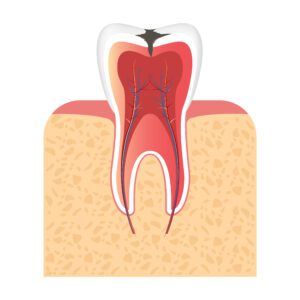At Krishees Dental, we know that maintaining your dental health is key to your overall well-being. Sometimes, preserving your smile requires more than just regular cleanings, it may involve advanced treatments like a root canal. Whether your dentist has recommended a root canal or you’re simply curious about the procedure, this guide will walk you through what to expect and help you feel confident about your treatment. At Krishees Dental, we’re committed to ensuring your experience is as smooth and comfortable as possible.
What is a Root Canal?
A root canal is a dental treatment designed to save a tooth that is badly infected or decayed. The pulp, which is the soft tissue inside the tooth containing nerves and blood vessels, can become inflamed or infected due to deep decay, cracks, or injury. When this happens, the infection can spread, causing severe pain and even leading to tooth loss if left untreated.
During a root canal, we remove the infected or damaged pulp, clean out the inner chamber, and seal the tooth to prevent further infection. This procedure allows you to preserve your natural tooth instead of opting for an extraction.
At Krishees Dental, we use cutting-edge technology and advanced techniques to perform root canals with precision, ensuring minimal discomfort and the best possible outcome for your oral health.
Signs You Might Need a Root Canal
Recognizing the signs that you need a root canal can help you avoid further damage and keep your smile intact. If you experience any of these symptoms, it’s essential to schedule an appointment with us as soon as possible:
1. Severe Tooth Pain
A persistent, throbbing toothache that worsens when chewing or applying pressure is a key indicator. The pain often starts deep inside the tooth and may radiate to your jaw or face.
2. Lingering Sensitivity
If you experience prolonged sensitivity to hot or cold foods and drinks, even after removing the stimulus, this may signal pulp damage. It’s a sign that your nerves could be affected, and a root canal may be necessary.
3. Swelling and Tenderness
Swollen or tender gums around a specific tooth could mean an infection or abscess at the root. You may also notice a small bump or pimple-like swelling on your gums.
4. Discoloration of the Tooth
If a tooth becomes darker or discolored, it could be a sign that the pulp inside is dying. This is a common reason why we recommend a root canal.
If you notice any of these symptoms, don’t wait reach out to Krishees Dental for an exam. Our team will determine whether a root canal is the best option for you.


The Root Canal Procedure at Krishees Dental
At Krishees Dental, we aim to make your root canal as quick and comfortable as possible. Here’s what you can expect:
1. Initial Consultation and X-Rays
We’ll start by examining the affected tooth and taking digital X-rays to determine the extent of the damage or infection. These X-rays help us assess whether a root canal is needed and plan the procedure accordingly.
2. Anesthesia for Comfort
To ensure you’re completely comfortable during the procedure, we’ll administer local anesthesia to numb the area. This means you won’t feel any pain, and you can relax throughout the treatment.
3. Removing the Infected Pulp
Once the area is numb, we’ll access the pulp chamber through a small opening in the top of the tooth. We then carefully remove the infected or damaged pulp. This step is crucial for eliminating the source of pain and infection.
4. Cleaning and Shaping the Root Canals
After the pulp is removed, we clean and shape the root canals to remove any remaining bacteria and debris. This step ensures that the tooth is sterile and prepared for sealing.
5. Filling the Tooth
We fill the empty root canals with a biocompatible material called gutta-percha to prevent future infection. If necessary, we may place a temporary filling to protect the tooth until you’re ready for a permanent restoration, such as a crown.
6. Follow-Up Appointment
A follow-up appointment is usually required to check the healing progress. We may also recommend a crown to restore the tooth’s strength and appearance. This will protect the tooth and help it function like new.
Is Root Canal Treatment Painful?
One of the biggest myths about root canals is that they’re painful. Thanks to modern anesthetics and advanced techniques, root canal treatments today are no more painful than getting a filling. Most patients report little to no discomfort during the procedure itself.
Afterward, you might experience mild soreness or discomfort for a few days, but this can be easily managed with over-the-counter pain relievers. The discomfort usually fades within a few days, and your tooth will feel much better once it has healed.
At Krishees Dental, we take extra steps to ensure your comfort and make your treatment as stress-free as possible.
Why Choose Krishees Dental for Your Root Canal Treatment?
When you choose Krishees Dental for your root canal, you’re choosing a team that is committed to providing exceptional care. Here’s why our patients trust us with their dental health:
– Experienced Dentists: Our highly trained team has years of experience performing root canals with great success, ensuring a positive outcome for you.
– Advanced Technology: We use the latest dental technology, including digital X-rays and precise instruments, to ensure the root canal is performed accurately and with minimal discomfort.
– Patient-Centered Care: We take the time to explain your treatment options, answer your questions, and make sure you feel relaxed and comfortable during your visit.
– State-of-the-Art Facilities: Our clinic is equipped with cutting-edge tools and modern technology to provide you with safe, efficient, and effective care.
– Comprehensive Dental Services: From routine checkups to cosmetic dentistry and orthodontics, Krishees Dental offers a wide range of services to meet all your oral health needs.


The Benefits of Root Canal Treatment
Root canal therapy offers several key benefits:
1. Pain Relief
The most immediate benefit is relief from the pain caused by the infection or decay. Once the pulp is removed and the tooth is sealed, the source of the pain is gone, and you’ll feel much better.
2. Preserves Your Natural Tooth
Instead of extracting the damaged tooth, root canal treatment allows you to save it, which is always the preferred option. Keeping your natural tooth helps maintain proper bite alignment and functionality.
3. Long-Term Solution
With proper care, a tooth that has undergone a root canal can last a lifetime. You won’t have to worry about future infections in the treated tooth, as long as you maintain good oral hygiene.
4. Restores Function
Once the tooth has healed, it will function like any other tooth. You’ll be able to chew, speak, and smile with confidence.
Aftercare for Root Canal Treatment
To ensure the best possible outcome, follow these aftercare tips:
– Avoid Chewing on the Treated Tooth: For a few days, avoid putting pressure on the treated tooth to give it time to heal.
– Use Pain Relievers as Needed: If you feel any discomfort, over-the-counter pain medications can help manage it.
– Maintain Good Oral Hygiene: Brush and floss regularly, but be gentle around the treated area.
– Attend Follow-Up Visits: Make sure to keep your follow-up appointments to monitor healing and discuss any further restorative work, such as a crown.
Conclusion:
A root canal is an effective and reliable way to save a damaged or infected tooth and restore your dental health. At Krishees Dental, we make sure your root canal treatment is as comfortable and stress-free as possible. Our expert team will guide you through every step of the process, ensuring you get the best care possible.
If you think you may need a root canal or if you’re experiencing any signs of tooth infection, don’t wait. Contact Krishees Dental today to schedule a consultation. Our friendly team is here to help you achieve a healthy, beautiful smile.
FAQs
1. What is a root canal, and why do I need one?
A root canal is a dental procedure that involves removing infected or damaged pulp from inside a tooth to save it from further decay or extraction. You might need a root canal if the pulp of your tooth becomes infected due to deep cavities, cracks, or trauma. The treatment eliminates the infection, relieves pain, and restores the tooth’s function, allowing you to keep your natural tooth.
2. How do I know if I need a root canal?
You may need a root canal if you experience symptoms like:
– Severe tooth pain, especially when chewing or touching the tooth
– Lingering sensitivity to hot or cold
– Swelling or tenderness in the gums around a specific tooth
– Discoloration (darkening) of the tooth
– A pimple-like bump on the gums near the affected tooth
3. Does a root canal hurt?
Contrary to popular belief, root canal treatments are typically not painful. We use local anesthesia to numb the area, ensuring that you feel little to no discomfort during the procedure. Most patients report only mild soreness after the treatment, which can usually be managed with over-the-counter pain relievers.
4. How long does a root canal take?
A typical root canal procedure usually takes about 1 to 2 hours to complete, depending on the complexity of the case. In some instances, especially for multi-rooted teeth, the procedure may require more than one appointment.
5. How long will a root canal last?
With proper care and maintenance, a root canal can last a lifetime. Most root canal-treated teeth remain functional for many years. After the procedure, it’s often recommended that the tooth be crowned to provide added strength and durability.

Leave a Reply